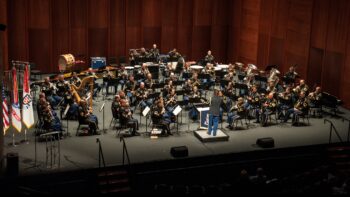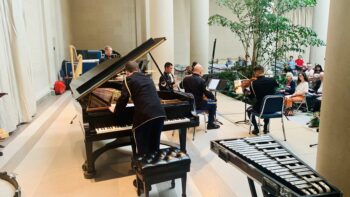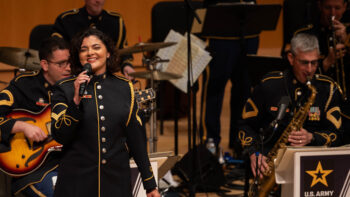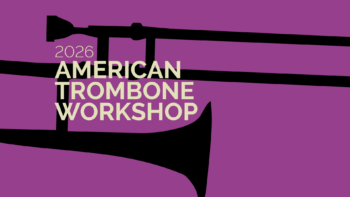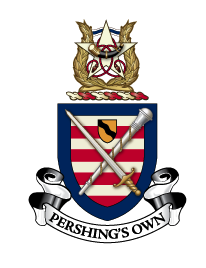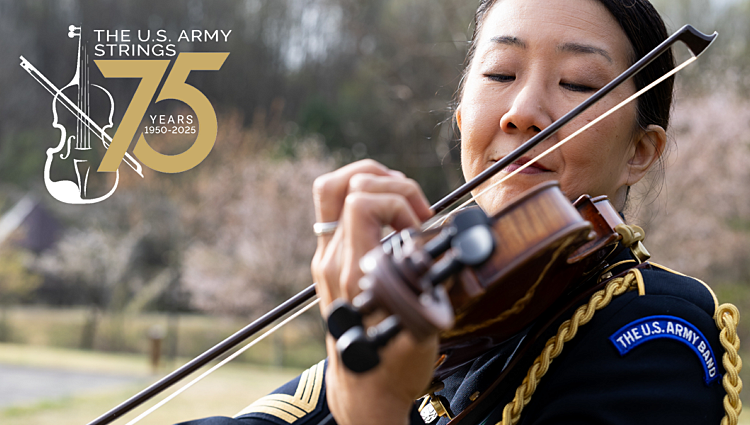
Army Strings 75th Anniversary Celebration / String Quartet
The U.S. Army Strings
Hear a lively program that looks at the past, present and future of American music, including Beethoven’s String Quartet No. 4, Op. 18, Jerome Kern songs, “Elegy” by Elliott Carter, “Carrot Revolution” by Gabriella Smith, and “Yankee Doodle.”Sat / Mar 8 / 1 pm
Location
Smithsonian National Museum of American History | Washington, DC
3rd Fl West, Taubman Hall of Music, 1300 Constitution Ave. NW
Program
Beethoven String Quartet op. 18, No. 4 in c minor
- Allegro ma non tanto
- Scherzo
- Menuetto
- Allegro
All the Things You Are and Bill / Jerome Kern
Elegy / Elliott Carter
Carrot Revolution / Gabriella Smith
Yankee Doodle / Traditional; arr. SFC Sara Corry
SFC Lisa Park, violin
SSG Charles Gleason, violin
SSG Austin Simmons, viola
MSG Ben Wensel, cello
Extras
Program Notes
Beethoven String Quartet No. 4, Op. 18 in c minor
Of Beethoven’s early op. 18 string quartets, his No. 4 is the only one written in a minor key. Keys have flavors, and c minor had been associated with sturm und drang in works of Haydn and Mozart. Beethoven himself used c minor to write his dramatic Fifth Symphony and “Pathetique” Piano Sonata.
Unconventionally, Beethoven stays in c (minor or major) for all four movements. He opens the piece with unrelenting pulsation in the cello and an unstable theme. Angst, rhythmic restlessness, and volcanic eruptions draw a caricature of conflict.
The quartet is without a slow movement. In an experiment unique for a string quartet of the time, the second movement relieves the tension with playful, almost clocklike, fugal counterpoint, showing that Beethoven was already tinkering with the form he inherited.
The third movement Menuetto restores the dark urgency of C minor with a trio temporarily brightening back into the major. Beethoven’s brisk tempo marking of “Allegretto” and repetition of spiky offbeat accents makes for a minuet that is far too quick and jagged to be danced with any type of decorum.
The final movement is a spicy rondo based on a "Gypsy" flavored refrain with repeated notes that invoke foot stomping for emphasis, and alternating lyrical episodes. The major versus minor drama of the entire quartet is encapsulated here with a battle that extends into the final bars of a wild, breathless “Prestissimo” romp. The piece ends with three gruff repetitions using the same pitches that started each of the earlier movements, now filled with the notes in between – notes that belong both to c minor and C Major. Reveling in this ambiguity, Beethoven ends with a wink.
“All the Things You Are” & “Bill” by Jerome Kern
Written for the 1939 musical Very Warm for May, All the Things You Are is a soaring declaration of love, with Oscar Hammerstein II’s lyrics portraying an idealized romance filled with longing and devotion. Beloved for its strong lyrical melody and complex harmonic structure, the song has since become a popular jazz standard.
Bill, originally composed in 1917 and later featured in Kern and Hammerstein’s 1927 musical Show Boat, presents a striking contrast in tone. Unlike the idealized romanticism of All the Things You Are, Bill is a heartfelt, subtly humorous ballad conveying an unshakable love for someone who is, by all accounts, quite flawed and ordinary.
These arrangements for string quartet reimagine Kern's songs through a more explorative, classical lens. Rhapsodic introductions, virtuosic accompaniment, and bold transitions to distant keys bring an elevated range of expression to these classic songs while preserving their original charm and emotional resonance.
Elegy, by American modernist composer Elliot Carter (1908-2012), was written for string quartet in 1943. Versions for viola or cello with piano accompaniment as well as a transcription for string orchestra followed in 1946 and 1952. The work received its premiere in Eliot, ME in 1946 by the Lanier String Quartet. Typical of Carter’s early work, Elegy hews closely to the tenets of Neoclassicism with simple harmonic and rhythmic elements – unlike his later compositions which made use of advanced applications of post-tonal chromatic harmony and rigorous rhythmic language. When asked later in life how he regarded his early work Carter responded:
“… they come up to me at concerts when they hear my old piece and say, “Why didn’t you keep that up? You were doing it so well! It had such liveliness, such freshness of sound!” As if to imply that when I got into less tonal stuff my music went to pot. Well, I certainly don’t think so. “But I like your earlier music very much.” Well, so do I! I’ve come to like it a second time, for I didn’t used to like it.”
John Bernard, “An Interview with Elliott Carter”
The True Significance of Elliot Carter’s Early Music, John W. Bernard
Elliott Carter Studies, edited by Marguerite Bond and John Link
Cambridge University Press, 2012
“Carrot Revolution” by Gabriella Smith
Both the title and the central concept of Gabriella Smith’s Carrot Revolution come from a quote by the painter Paul Cézanne: “The day will come when a single, freshly observed carrot will start a revolution.” Written in 2015 for the Aizuri Quartet, the piece is a musical collage written, as Smith puts it, “as a celebration of the spirit of fresh observation and of new ways of looking at old things.” Multiple sections of music flow into each other, drawing on influences ranging from 12th century chant to folk music to 70’s rock and roll, all arranged in novel ways to create a single musical journey.
“Yankee Doodle,” arranged by SFC Sara Corry
Imagine taking a familiar tune, giving it a playful twist, and sending it on a whirlwind adventure—this piece does just that. Inspired by Souvenir d’Amérique, Henri Vieuxtemps’ 1843 set of variations on Yankee Doodle, this string quartet reimagines the iconic melody with fresh harmonies, unexpected turns, and plenty of virtuosic flair. Each instrument—the violins, viola, and cello—takes a turn in the spotlight, pushing the boundaries of the tune while still keeping its lively, toe-tapping spirit intact. As we celebrate the 250th anniversary of the Revolutionary War, this piece pays homage to one of America’s most enduring musical symbols, proving that even after two and a half centuries, Yankee Doodle still has a few surprises up its sleeve.
About the Performers
A native of Western New York, MSG Benjamin Wensel earned degrees from the Cleveland Institute of Music and Eastman School of Music, where he served as assistant to renowned pedagogue Alan Harris. Equally important to his musical education were performances in seminars and master classes for members of the Cleveland, Guaneri, Juilliard, Miami and Ying quartets; chamber music studies with Peter Salaff and members of the Audubon and Cavani Quartets; and solo master classes with David Soyer, Clemens Michael Hagen, Steven Isserlis and Michel Strauss. Wensel has performed with the Baltimore Symphony Orchestra, National Symphony Orchestra, ProMusica Chamber Orchestra, Rochester Philharmonic, Syracuse Symphony, and has been a member of The U.S. Army Strings, Orchestra and String Quartet since 2003. Additionally, Wensel appears with many of the fine local ensembles in the National Capital Region. Dedicated to the creation and promotion of new music, Wensel performed the world premieres of more than 20 works written by established and emerging American composers as a founding member of the Tarab Cello Ensemble and participated in the ensemble’s residencies at Princeton University, Stetson University, and the University of South Florida. He currently coaches for the 9th Street Chamber Music, Quartet Intensive program as well as maintaining a private studio in Fairfax, Virginia. Grateful to be an active member of the innovative arts community of the Capital region, Wensel performs regularly as the cellist of the Mellifera Quartet. He can be heard on recordings produced by Bridge, Delos, Harmonia Mundi, RM Records, and Summit.
SFC Lisa Park received a B.A. in Psychology and was awarded the Hastings Prize in Musical Performance at Harvard University. Park performed with the Ying Quartet at Harvard and studied at the Eastman School of Music for one year. She received an M.M. from Rice University and a Performer’s Diploma from Southern Methodist University while serving as undergraduate violin instructor. Her teachers include Roman Totenberg, Emanuel Borok and Cho-Liang Lin.
She has served as concertmaster of ensembles including the Castleton Festival Orchestra under the late Lorin Maazel, National Orchestral Institute under David Robertson, Arlington Philharmonic, New Orchestra of Washington, and Rockville Bach Academy. Park has performed as featured soloist with the New England String Ensemble on the Boston Esplanade, The U.S. Army Orchestra, Harvard Bach Society Orchestra, Wellesley Symphony, and Boston Civic Symphony. Park received fellowships from the Aspen Music School, Kneisel Hall Chamber Festival, Moritzburg Academy, and was artist-in-residence at Atlantic Music Festival. As a proponent of new music, she has performed with contemporary ensembles including the 21st Century Consort at the Hirshhorn Museum.
Park was the first placing violinist in the USA International Music Competition and New England String Ensemble Competition and was recipient of the Volkswagen Prize for Best Chamber Music Performance (Moritzburg Academy). Prior to joining the U.S. Army Strings in 2015, Park served as Professor of Violin and Music Theory at Richland College in Dallas, TX. An active educator, Park has served as an adjudicator at local concerto competitions. She is a member of the Pi Kappa Lambda music honor society.
SSG Charles Gleason grew up in Columbus, OH, where he studied violin extensively with Stephen Sims, adjunct professor at the Cleveland Institute of Music, and Christian Howes, Columbus-based jazz violinist. He later pursued his bachelor’s degree at the Cleveland Institute of Music, studying with David Updegraff and later Joan Kwuon. As a participant in CIM’s Intensive Quartet Seminar, led by Peter Salaff and the members of the Cavani Quartet, his quartet was a semifinalist in the Fischoff National Chamber Music Competition and performed as part of the Kennedy Center Conservatory Project in Washington D.C. Gleason went on to pursue his master’s at Rice University’s Shepherd School of Music, studying with Cho-Liang Lin. Apart from school, he has participated in summer festivals and workshops that include the Verbier Festival Orchestra, the Lucerne Festival Academy, the Madeline Island Chamber Music Festival, and the Juilliard String Quartet Seminar. Gleason graduated from Rice in 2020, and after a year away from school, he joined the U.S. Army Strings in June of 2021.
SSG Austin Simmons grew up in Arlington, Texas, so he is both pleased and amused that fate led him to a career in Arlington, Virginia. Before joining The U.S. Army Strings in 2022, Simmons earned both his Bachelor and Master of Music degrees in viola performance from Rice University in Houston, Texas, where he studied with Ivo-Jan van der Werff. Throughout his musical education, Simmons enjoyed a number of artistic collaborations. Most notably, as a seasoned string quartet musician, he was invited to join Madeline Island Chamber Music’s Quartet in Residence program in 2018, where he performed the works of Hadyn and Britten across the Twin Cities. Additionally, with musical interests branching outside the realm of classical music, Simmons has played alongside artists such as Hungarian pianist Balázs Havasi and Colombian singer Fonseca. When he isn't making music, Simmons enjoys cooking, lifting weights, and dabbling in game design.
Get Social
- Sign up for our Email list


